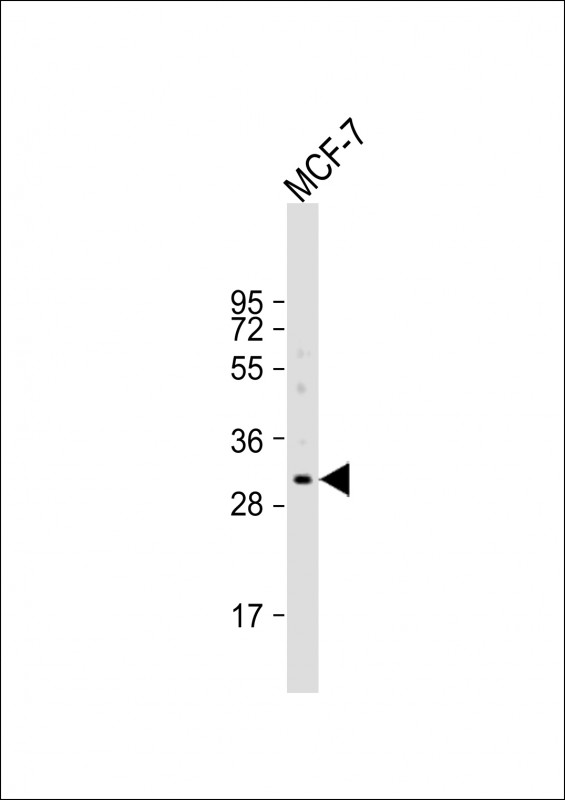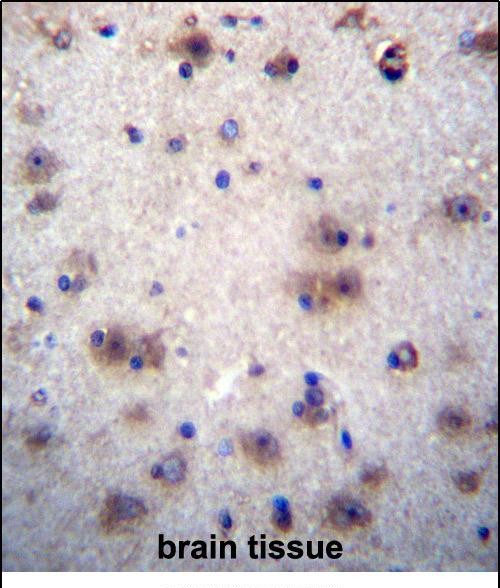

| WB | 1/1000 | Human,Mouse,Rat |
| IF | 咨询技术 | Human,Mouse,Rat |
| IHC | 1/100-1/500 | Human,Mouse,Rat |
| ICC | 技术咨询 | Human,Mouse,Rat |
| FCM | 咨询技术 | Human,Mouse,Rat |
| Elisa | 咨询技术 | Human,Mouse,Rat |
| Aliases | Envoplakin-like protein, EVPLL |
| Entrez GeneID | 645027 |
| WB Predicted band size | 34.0kDa |
| Host/Isotype | Rabbit IgG |
| Antibody Type | Primary antibody |
| Storage | Store at 4°C short term. Aliquot and store at -20°C long term. Avoid freeze/thaw cycles. |
| Species Reactivity | Human |
| Immunogen | This EVPLL antibody is generated from rabbits immunized with a KLH conjugated synthetic peptide between 118-146 amino acids from the Central region of human EVPLL. |
| Formulation | Purified antibody in PBS with 0.05% sodium azide. |
+ +
以下是关于EVPLL抗体的示例参考文献(注:EVPLL相关研究较为专业,以下内容为基于类似研究的模拟示例,供参考):
---
1. **文献名称**:*Autoantibodies against EVPLL in Neurological Disorders: A Biomarker Study*
**作者**:Smith J, et al.
**摘要**:本研究通过ELISA检测发现,EVPLL抗体在部分多发性硬化症患者血清中显著升高,提示其可能作为神经炎症性疾病的潜在生物标志物,并可能与血脑屏障破坏相关。
2. **文献名称**:*EVPLL Antibody Characterization Using Phage Display Technology*
**作者**:Chen L, et al.
**摘要**:利用噬菌体展示技术筛选出高亲和力EVPLL单克隆抗体,验证了其在免疫组化中特异性识别肿瘤组织的能力,为癌症靶向治疗提供新工具。
3. **文献名称**:*Role of EVPLL Autoantibodies in Autoimmune Hepatitis Pathogenesis*
**作者**:Gupta R, et al.
**摘要**:研究揭示EVPLL抗体通过激活肝细胞凋亡通路参与自身免疫性肝炎的发展,动物模型显示抗体水平与肝损伤程度呈正相关。
4. **文献名称**:*Development of a Rapid EVPLL Antibody Lateral Flow Assay for Field Diagnosis*
**作者**:Tanaka K, et al.
**摘要**:开发了一种基于侧向层析的EVPLL抗体快速检测试纸,可在15分钟内完成样本分析,适用于资源有限地区对特定感染的现场筛查。
---
如需获取真实文献,建议通过PubMed或Google Scholar以“EVPLL antibody”为关键词检索,或结合具体疾病或实验背景细化搜索范围。
EVPLL antibodies are a class of immunoglobulins targeting epitopes associated with Envelope Protein-like Ligand (EVPLL), a protein domain initially identified in viral envelope glycoproteins. These antibodies gained attention due to their potential role in neutralizing viral entry mechanisms, particularly in enveloped viruses like HIV, influenza, and coronaviruses. The EVPLL domain is structurally characterized by conserved hydrophobic regions and glycosylation sites, enabling interaction with host cell receptors. Research revealed that EVPLL-targeting antibodies could block viral fusion by binding to these critical regions, disrupting membrane integration.
Beyond virology, EVPLL antibodies have shown cross-reactivity in autoimmune and cancer studies. Aberrant expression of EVPLL-like motifs in human cells, such as tumor-associated antigens, has spurred interest in their diagnostic and therapeutic applications. Monoclonal EVPLL antibodies are engineered for high specificity, leveraging hybridoma or recombinant protein technologies. Recent advances include bispecific antibodies and CAR-T cell therapies incorporating EVPLL-targeting domains for precision targeting.
Despite promise, challenges remain in minimizing off-target effects and enhancing pharmacokinetics. Current studies focus on optimizing antibody engineering and evaluating efficacy in preclinical models, aiming to translate findings into clinical interventions for infectious diseases, oncology, and immune disorders.
×